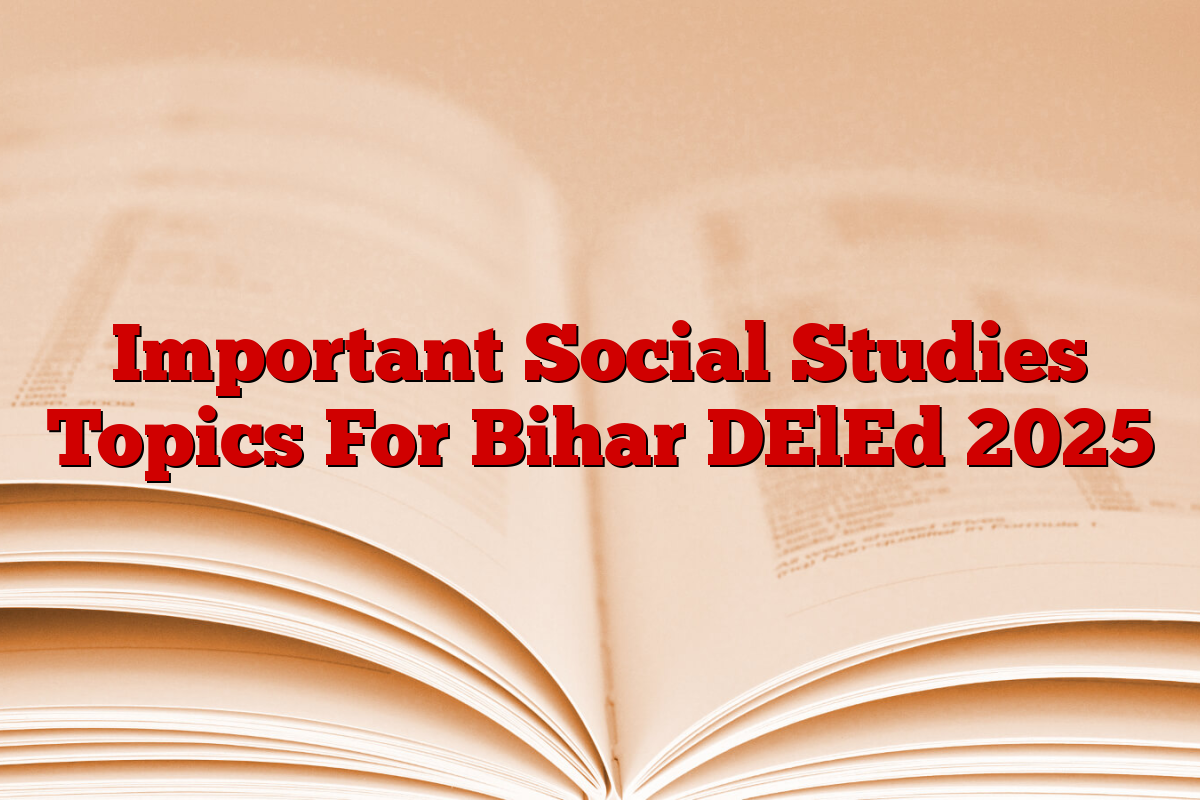Bihar Dalid Examination is an important step for teachers seeking admission in a 2 -year diploma in primary education (D.L.Ed) program. As the exam reaches, candidates often experience a mixture of enthusiasm and anxiety. To support their preparation, we have prepared a list of important social studies subjects for Bihar 2025. The purpose of this article is to provide a well -structured study plan to the candidates, promoting their confidence and improving their chances of success.
Social Studies Section Importance in Bihar 2025
Social Studies Section plays an important role in Bihar Delaide Exam, which has 20 out of 120 marks. It assesses the knowledge of candidates in history, geography, economics, politics and social studies teaching, emphasizes their application in teaching. A strong understanding of these subjects is necessary not only to achieve good marks, but also to effectively educate young minds in social sciences.
- Star contribution: The Bihar Dalid Exam has 20 marks in the Social Studies section.
- Subject coverage: History, geography, economics, politics and social studies include subjects of educational.
- Application-based questions: Practical knowledge focuses on a teaching context.
- Teaching relevance: Ensures that future teachers are well equipped to teach fundamental social science concepts.
- Scores-booming opportunity: With effective preparation, social studies can be a high scoring section.
Important Social Studies Topic for Bihar 2025
To increase our preparation for the Social Studies section, we have identified major topics based on their relevance and the trends of the previous exam. Ensuring efficient preparation by focusing on these essential areas will help in streamlining your study plan. Mastery in these subjects will promote your confidence and improve the possibility of scoring well in the exam.
| Important Social Studies Topic for Bihar 2025 | |
| Subject | Subject |
| History | Ancient History: Indus Valley Civilization, Vedic Age, Buddhism and Jainism, Mahajanapadas, Maurya Empire, Gupta Empire, Vardhana Dynasty |
| Medieval History: Delhi Sultanate (Das, Khilji, Tughlaq, Sayyid, Lodi Dynasty), Bhakti Movement, Sufism, Vijayanagar and Bahmani State, Mughal Kaal (Babur to Latter Mughal), Maratha, Advent of European people | |
| Modern History: Rebellion of 1857, Rise of Nationalism (Ink, Partition of Bengal, Indigenous Movement), Rolaut Act, Civil Disobedience Movement, Social Reform Movement, Indian National Movement (Cripps Mission, India Movement, Cabinet Mission), World War I. | |
| Politics | Constitutional framework: Creating constitution, main features, preamble, fundamental rights (right to equality, right to freedom, right against exploitation) |
| Central Government: Parliament (Lok Sabha and Rajya Sabha), Supreme Court, Panchayati Raj System | |
| Constitutional Body: UPSC, Election Commission, CAG, result | |
| Other important topics: Emergency provision, criminal law, judicial review | |
| Geography | Geomorphology: universe, rocks, mountains, drainage systems |
| Climate: The structure and structure of environment, winds, cyclones | |
| Indian Geography: Rivers, Vegetation, Minerals and Energy Resources, Transport Systems | |
| World Geography: World boundaries, countries, deserts, strands and isthmus | |
| economy | Indian economy: population growth, banking system, inflation, monetary policy |
| Agriculture and Industry: Green Revolution, Food Safety, Major Industry, Cottage Industry | |
| Public Finance: Budget, Taxation System, Plan in India | |
| Statical GK | UNESCO World Heritage Site, National Park and Wildlife Sanctuary, Ramsar Sites, major dams in India |
| Topic | Government policies and schemes, appointments and resignations (PM, CM, Governor, Chief Justice, Head of Organizations), Awards and Honors (National and Internationals), Defense (Military Exercises, Missiles, Acquisition), Summit, Agreement and Mouss |
| Art and culture | UNESCO cultural sites, classical and folk dances, fairs and festivals in India |
| State G.K. | Capital, CM, Governor, major national park and wildlife sanctuary, important festivals and dance forms |
Preparation Tips for Bihar Social Studies Section
To score well in the Social Studies Section of Bihar Delaide Examination, candidates should adopt a strategic view and develop a deep understanding of major concepts from history, geography, civil scripture and economics. Success in this section depends on both knowledge retention and ability to effectively apply concepts. Here are five necessary preparations tips to help you excel in the examination.
- Understand the course well: Familiarize yourself with the official social study course, including subjects such as history, geography, civil scripture and economics.
- Create small notes for quick amendment: Present major events, dates, definitions and concepts in brief notes. This will help in quick amendment during the last few days before the exam.
- Practice map work and diagrams: Many questions in geography and history require map work and diagrams. Practice drawing and labeling maps of India and the world, focusing on important rivers, mountain ranges, states and capitals.
- Solve last year’s papers and fake tests: Solve last year’s question papers and try regular mock tests to achieve the spirit of exam pattern and improve time management.
- Pay attention to the subjects provided: Candidates should use these important social studies subjects for Bihar 2025 for a concentrated preparation.
sharing is Caring!

